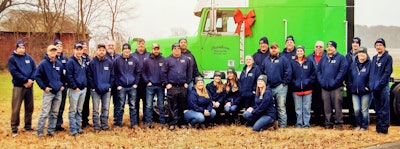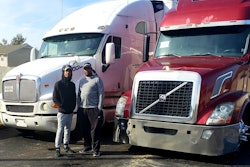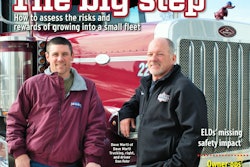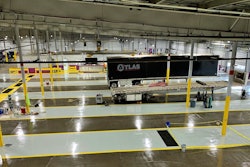Previously in this series: No. 1 expansion challenge: 6 in 10 readers say it’s finding dependable drivers
Insurance costs
All fleet owners consulted for this series of stories except Dave Marti, who minimizes insurance problems by leasing his fleet to a larger carrier, expressed some frustration with liability insurance rates.
The current “hard market” for commercial liability has made it difficult for insurers to make money, says insurance agent Steve Libertore. Reasons include the high cost of accident litigation and the increased demand for drivers, which has led some fleets to relax hiring standards, resulting in less experience behind the wheel. Vehicles are more expensive than ever, thus more costly to insure for physical damage and, crucially, more expensive to replace when a loss occurs, driving up liability claims costs.
And what happens when an at-fault four-wheeler’s minimum required liability policy, as little as $10,000 to $15,000 in some states, is exhausted by an expensive Class 8 loss? You guessed it — truckers’ insurance carriers foot the bill, a principal injustice of the way insurance requirements are structured in most every state, suggests Jeff Moss, president and owner of Navigator Truck Insurance, a Michigan-based agency.

New administrative and compliance burdens
For employee drivers, employers share the burden of tax payments for Medicare and Social Security. They’re responsible for withholding taxes from paychecks and dealing with unemployment insurance, workers compensation and more.
The effort to avoid some of these costs and red tape is one reason the independent contractor “misclassification” issue has plagued trucking, particularly out West. Yet when employers pay company drivers like contractors, it can create problems for drivers and owners if the IRS comes calling.
There’s more to the administrative hurdles of small fleet ownership, too. You’re now responsible for drivers’ required drug and alcohol testing. (Membership in the National Association of Small Trucking Companies can help here.) You have to maintain driver qualification files with consistently updated records, which your insurer will be particularly interested in as you grow. If you grow to 50 full-time employees, your business will need to comply with the Affordable Care Act.
And while familiar to most any trucker, compliance with federal safety regulations can present new issues when a carrier with authority builds beyond a single power unit. A single driver running afoul of an inspector, racking up repeated violations, can send a small carrier’s safety scores in the CSA Safety Measurement System’s category very high, very quickly.
The safety scores computed there aren’t publicly available at present as the federal government works to revamp the program, but sharing among carriers and freight partners such as brokers and shippers is routine. High scores could cause problems for a carrier with those partners, jeopardizing the foundation on which the business stands.
Managing current customers and finding new business
 “I was always one of those guys who if I go in somewhere and see somebody I wouldn’t mind doing some business with, I always carried my business cards and would be out doing sales when I was trucking.” —Davidson Trucking owner Daniel Davidson about the practice that helped him grow his business to 20 trucks over 25 years. His sales instincts and acumen are shared by many successful small-fleet owners. Davidson (the third man to the right from center) and most of his team are shown here in the company’s 2018 Christmas photo.
“I was always one of those guys who if I go in somewhere and see somebody I wouldn’t mind doing some business with, I always carried my business cards and would be out doing sales when I was trucking.” —Davidson Trucking owner Daniel Davidson about the practice that helped him grow his business to 20 trucks over 25 years. His sales instincts and acumen are shared by many successful small-fleet owners. Davidson (the third man to the right from center) and most of his team are shown here in the company’s 2018 Christmas photo.Any successful fleet owner will maintain consistent communication with customers as conditions change, adjusting rates to cover rising expenses and maintain profitability. Not to mention keeping an eye out for new business, as Daniel Davidson’s quote above illustrates.
To do all that effectively, you need the people skills necessary to prospect for new customers and then develop the relationships over the long term.
You’ll need to negotiate rate increases when warranted and, on the flip side, know when to give to save the business without surrendering a healthy profit margin.
While fleets traditionally have grown with between one and several direct shipper customers – often with a single major contract as their bread and butter – close customer relationships with brokers also can serve the same role in today’s freight market. Rely too much on “one and done” freight partners among brokers, however, and you’ll be left high and dry when the economy takes a turn for the worse.
Unlike many other aspiring small fleets, Andre Jackson and Donte Ogletree launched their business without a loyal high-volume customer. While it’s attractive to engage in the romantic “build it and they will come” adage, adding capacity is much easier if there’s clear demand for it, whether the customer is a shipper or a broker.
Midnight Xpress, though, did have a plan: Build relationships with repeat customers among the brokerages they use. After a year, one Atlanta-based broker had made the fleet one of his go-to capacity sources. The help was so good that Ogletree delivered a gift card in person to the broker as a token of appreciation. The owners know that building such relationships will be key to the success of their three-truck fleet.
Next in this series: Small fleet growth isn’t limited to adding trucks











